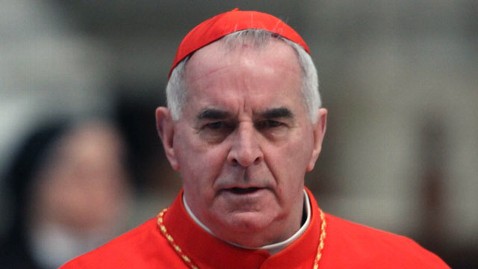Can a Voting Cardinal Skip Papal Conclave?

(Franco Origlia/Getty Images)
ROME-Today's British Cardinal Keith O'Brien announced he will not be attending the conclave. But, as a prince of the church, can he refuse to do so?
As of today, the pope accepted O'Brien's resignation as Archbishop of St. Andrews and Edinburgh. But O'Brien retains the title of cardinal and is eligible to vote in the conclave.
He made it clear he does not intend to do so.
READ MORE: Cardinal resigns amid sex allegations
"I will not join them for this Conclave in person," O'Brien said in a statement. "I do not wish media attention in Rome to be focused on me - but rather on Pope Benedict XVI and on his Successor."
The Vatican has insisted all week that attendance is mandatory. Electing the new pope, officials have said, is one of a cardinal's most important, most sacred jobs and no "political or worldly issues" should keep him from it.
The issue has come up repeatedly in the context of the church abuse scandal. Los Angeles Cardinal Roger Mahony, Irish Cardinal Sean Brady and others have faced intense pressure in their communities to recuse themselves on moral grounds, amid evidence they covered up for pedophile priests.
President Obama's outgoing ambassador to the Holy See Miguel Diaz reportedly said yesterday that Mahony should, "reflect on the example set by the pope."
"He certainly has the legal right to vote in the Conclave," Diaz told Italy's La Stampa. "But the Pope also had the right to continue as Pope but instead chose to step down."
To do so would certainly be unusual. During the last conclave Cardinal Bernard Law's participation was the focus of vehement protests. But he took his place in the Sistine Chapel nonetheless. (Law is now 81, too old to vote this year.)
But does canon law allow an eligible cardinal - such as O'Brien, Mahony or Brady - not to attend?
The answer appears to be yes, and not just because of medical emergency.
Typically, only cardinals with incapacitating illness are excused from their duties to attend the conclave. Last week Cardinal Julius Darmaatmadja of Indonesia begged off for precisely that reason, bringing the number of voting cardinals (under age 80) to 116.
In the past, voting cardinals from remote archdiocese also missed the occasional conclave because of the difficulties of travel. The Vatican adopted the 15-20 day rule, which was in force until today, to accommodate American cardinals traveling long distance to get here. (The advent of air travel has obviously made that less of an issue.)
Faced with repeated questions about cardinals embroiled in scandal, Vatican officials have insisted those are the only reasons for cardinal electors to miss an election.
Amended rules issued today by Pope Benedict call attention to an article in the Apostolic Constitution Universi Domenici Gregis, the rules governing a papal vacancy and election.
These rules do anticipate the circumstance of a cardinal refusing to take part in a papal election for reasons other than illness.
Under Paragraph 40, there's this:
If a Cardinal with the right to vote should refuse to enter Vatican City in order to take part in the election, or subsequently, once the election has begun, should refuse to remain in order to discharge his office, without manifest reason of illness attested to under oath by doctors and confirmed by a majority of the electors, the other Cardinals shall proceed freely with the election, without waiting for him or readmitting him. The paragraph goes on to say if the cardinal leaves for medical reasons - or "for some grave reason acknowledged as such by the majority of electors" - and later wants to come back, the conclave must readmit him.
So it appears O'Brien can indeed give the conclave a miss if he feels he'll be a distraction. The question now: What about Mahony and Brady?